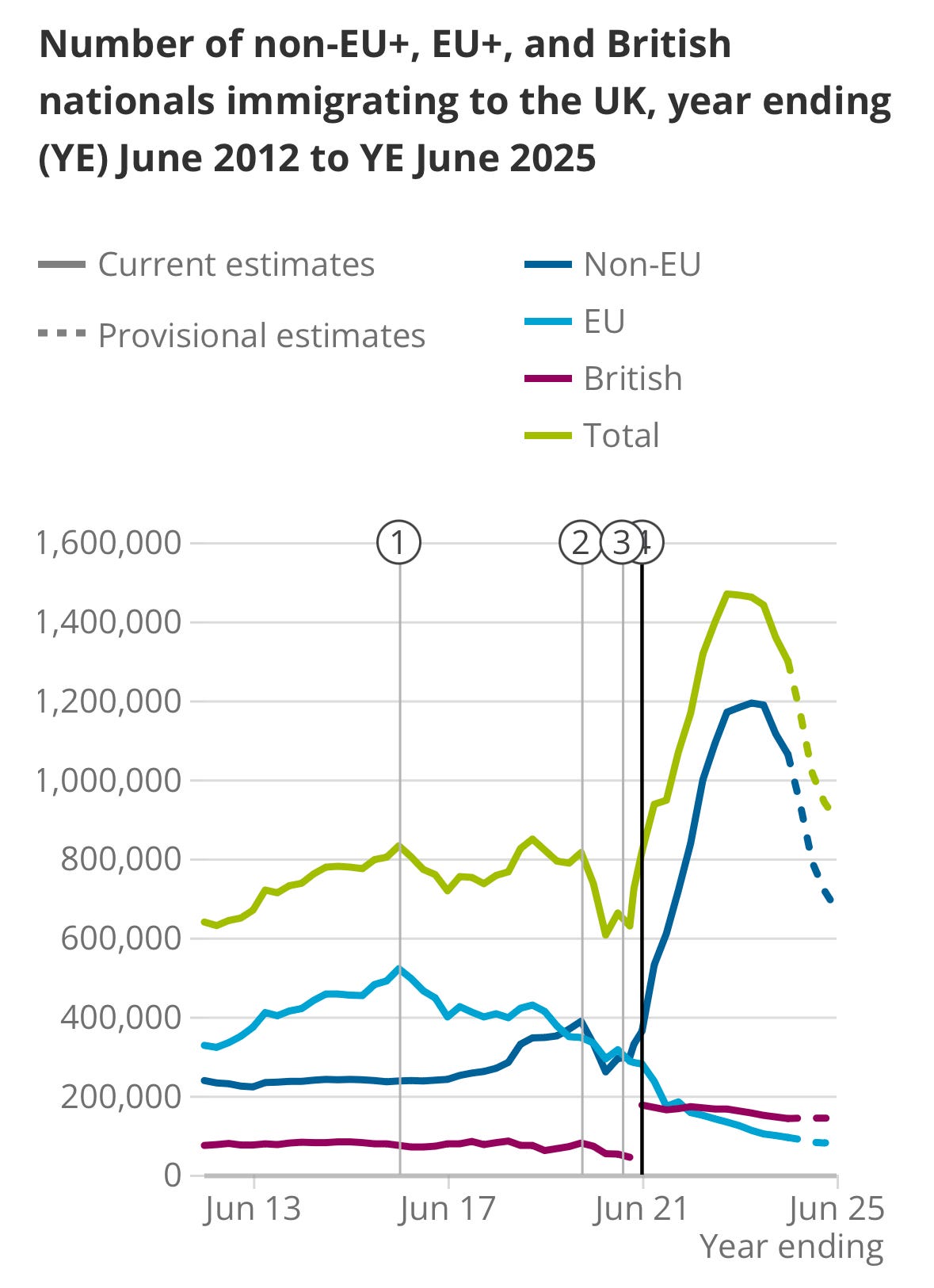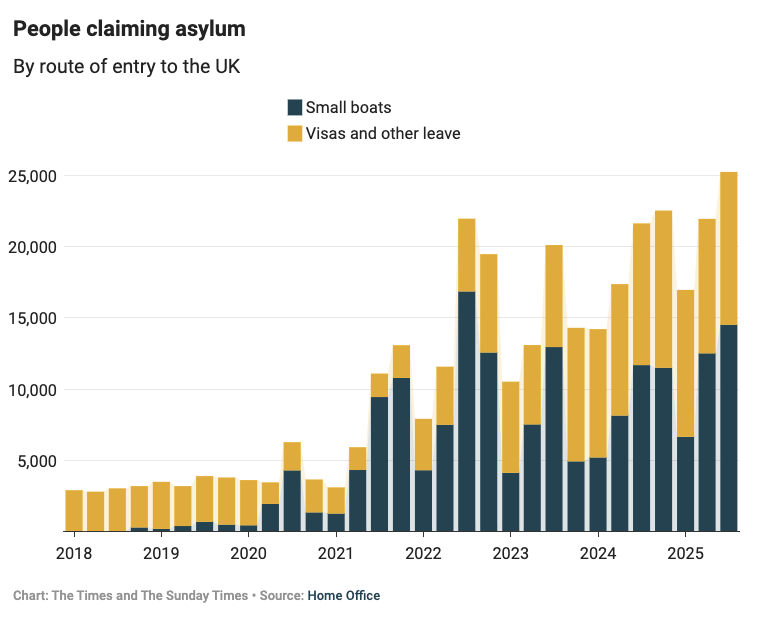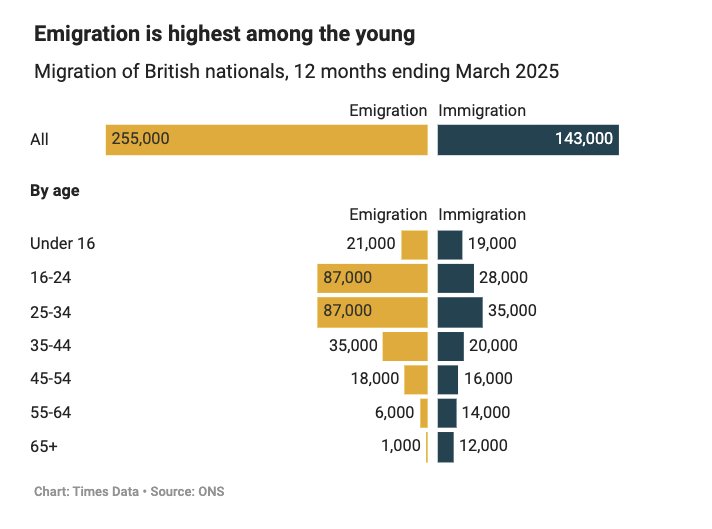Why the "Fall" in Net Migration is not what you think: a deep dive into the new numbers
Matt Goodwin’s newsletter goes to 90,300 subscribers from 181 countries. Like our stuff? Then become a paying supporter. Help us while gaining access to exclusive posts, the archive, events, discounts, comments and support independent writers making a difference. Join us on YouTube, Insta, TikTok, X and Facebook.
The Labour government is celebrating. Home Secretary Shabana Mahmood is beaming. Left-wing commentators are rushing to declare victory. And social media is full of triumphant posts. Why?
Because net migration into the United Kingdom, we are told, has collapsed. The immigration crisis is over. Britain is finally getting control. Nothing to see here.
But once again, when you look past the headlines and take a closer look at the numbers you will find a very different story to the one you hear in Westminster.
This week, the Office for National Statistics released its provisional long-term immigration figures for the year ending June 2025.
Yes, net migration is down.
It has fallen from 649,000 last year to about 204,000 today —meaning 204,000 more people entering the country than leaving each year.
The first thing to say, as many of you know, is that this number appears low because the previous figures were among the highest in British history.
The so-called collapse of net migration does not return us to anything resembling normality —to a stable, integrated country with manageable rates of change.
Far from it.
It merely takes us back to the post-Brexit baseline —a baseline that still involves adding hundreds of thousands of people —roughly equivalent to adding a city the size of Portsmouth—to the population each year.
And remember, too, these are only provisional estimates.
Nearly every time the ONS revises its migration statistics, the numbers increase. The basic story of the last thirty years has been one of civil servants getting it wrong.
So no, the migration crisis has not magically resolved itself. And no, these numbers do not mean the British people have suddenly got what they wanted.
But now look at the detail, which is where you really start to grasp what is going on in this country —and, personally, I don’t think it’s good at all.
Last year, net migration into Britain from outside Europe was 383,000.
In fact, what the numbers show is that 75% of all immigration into Britain today is coming from radically different cultures and nations—Pakistani, Bangladesh, Nigeria, Eritrea, Afghanistan, among many more.
Meanwhile, enormous numbers of people left Britain, which helps to explain why the overall net migration figure is low. Lots of Europeans left, but so too did lots of British people —especially young British people, many aged 16-34-years-old.
Is it any surprise given the Labour budget this week? Why would hardworking, entrepreneurial twenty-and-thirty-somethings stay in a country that forces them to subsidise a failing immigration regime and soft-on-crime policies while also hitting them with the highest tax burden on record and declining living standards?
At the same time, the number of asylum-seekers, illegal migrants, and refugees has rocketed to record highs. Asylum-seekers and illegal migrants now account for nearly half of all total net migration into Britain. Long-term immigration of asylum-seekers was 96,000 last year. It is now double the share it was six years ago.
More than half of all asylum-seekers entered Britain illegally, while more than 41,000 claimed asylum after arriving in the UK on another kind of visa, which is insane. Nearly 15,000 international students came to Britain and then claimed asylum.
This is a joke; an absolute joke of a system.
Meanwhile, we learn that asylum hotels are up nearly a quarter since when Labour came to power, last year, with 108,000 asylum-seekers now being subsidised by the British taxpayer in hotels, bedsits, and housing for multiple occupants.
And the number of small boat migrants who are being deported is down since Labour came to power; they have deported only 2,852, which is lower than the period before Keir Starmer became prime minister, and reflects the fact our leaders have only removed 3.5% of all migrants who have entered Britain illegally since 2018.
The British state has just utterly failed; it is completely incompetent.
In fact, if you want a symbol of what is really going on in Britain then consider this: while 109,000 more British people left the country last year than returned, almost exactly the same figure, 110,000, claimed asylum in the country. This one fact tells you a great deal about the kind of country our leaders are now building around us.
It is indefensible.
We are losing lots of Brits, lots of Europeans, lots of high-skill professionals, while replacing them with lots of non-Europeans, from radically different cultures, who have few skills, are working on low wages, and have low levels of education, as well as asylum-seekers and illegal migrants who are often breaking our laws.
Our hapless leaders, in other words, are still reshaping our economy, our culture, our population, our country around masses of people from outside Europe who not only hold very different values but are a net fiscal cost, a net drain, on the economy.
And it’s not only me saying it.
As one researcher from Oxford’s Migration Observatory pointed out this morning: “it does seem that the composition of migration has become less favourable from an economic perspective, with fewer people getting skilled worker visas and a higher share of refugees, who often need a lot of support”.
This is expert speak for: this no longer makes any sense.
Of course, we pointed this out a very long time ago, right here in this newsletter, but only now is the mainstream debate starting to catch up.
This is the system that was created after Brexit by Boris Johnson, and which, albeit with some tweaks here and there, has continued ever since.
More global routes for workers and students. Stricter rules for Europeans. Porous borders. All of which is now driving a shocking demographic shift that few politicians are willing to discuss and will soon leave our country unrecognisable.
What kind of country are we building here? What kind of population? Why are we hollowing out our economy like this? With non-Europeans and asylum-seekers pouring in, and rising numbers of British people and Europeans leaving, where are we heading as a country, as a culture? Is anybody in Westminster even asking this?
And even if net migration does stabilise at around 200,000 a year —which I doubt it will given we also know the government and OBR are working on the assumption it will average around 340,000 indefinitely—can we really add two million people, mainly non-Europeans, to the country in just one decade? Who voted for this?
The truth is simple. The British people consistently want immigration to be much lower and the pace of demographic change to slow. And yet the system consistently does the opposite while politicians consistently insist everything is fine.
But everything is not fine. The overall numbers may be down this year, but the long-term trajectory has not changed. Britain is still on course for rapid demographic transformation without consent, without transparency and without any serious democratic debate. That is the real story in those numbers.





The wealth creators are going and the wealth takers are coming. Doom loop is the right word to describe this: we are decaying from the inside. We have governments, both Tory and now Labour, who not only condone this but encourage it. We are in the process of losing our country, as an 84 year old it will not affect me living in deepest Suffolk but I do feel for others who have to endure our foreign looking streets and ghettoes. We do need action and no party other than Reform is taking any notice.
As soon as I saw the BBC trumpeting the fall, I started to question the numbers. We’re clearly being replaced! We all need to contribute to stopping this now!